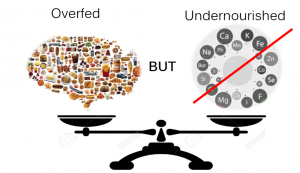Nutrient content in modern times. A Scientific Review.

Profound changes in the environment are more obvious than ever. Elevated atmospheric CO2 , environmental pollution, industrialization of land, lower nutrient quality to meet global food demand. The immense consumption of sugar and processed foods resulting in nutrient gaps through modern diet and lifestyle, is a reality.
Genevia Lifesciences scientific research, on how the food we eat today has been affected through the last 50 years and how this is connected to people’s health and wellbeing is discussed. Worldwide individual studies and metanalyses, reveal the extend our nutrient intake has declined significantly from the food we consume, as a result of nutrient deficient soils and overall environmental changes from human intervention and bad dietary patterns.
Each year about 10 million ha of cropland are lost due to soil erosion, thus reducing the cropland available for food production. The World Health Organization (WHO) reports that more than 3.7 billion people are malnourished in the world, through “hidden hunger” (vitamin and mineral deficiency). About 820 million people globally are affected by crops’ yields decline and agronomic production resulting in food-insecurity and low concentration of protein and micronutrients. Feeding the world population, by 2050 (projected to be 9.5 billion), necessitates an increase in agricultural production of ~70% and global protein demand by 80% over today’s levels.

CO2 is the most important, accounting for 60% factor of global warming. Currently, CO2 in Earth’s atmosphere is at record levels of 412 parts per million (ppm) and rising. Total emissions from global livestock is estimated to 7.1 Gigatonnes of CO2 – equiv. per year, representing 14.5% of all anthropogenic greenhouse gas emissions which in turn accelerate the climate change worldwide.
Historical Data studies and Free to Air CO2 Enrichment (FACE) experiments within multi-country collaboration schemes, examine the significant declines in the amount of nutrients such as protein, minerals like calcium, iron, zinc and vitamins like vitamin B1 (thiamine), B2 (riboflavin), B5 (pantothenic acid) and B9 (folic acid) and vitamin C in crops.
In most Western countries and the United States, diet-related chronic diseases represent the single largest cause of morbidity and mortality. Overweight and obesity among adults are at record levels with 38.9% of adults being overweight or obese, stretching from Africa to North America, and increasing among adolescents. The paradox is that humankind in most areas of the world are overfed and obese but still undernourished.

Putting the evidence in the frame of how the quality of our food is affected by environmental changes, in addition to bad dietary habits, the empty food syndrome is underappreciated. Genevia Lifesciences, is working on further understanding the true nutrient decline affect and the food quality impact on human health and longevity.